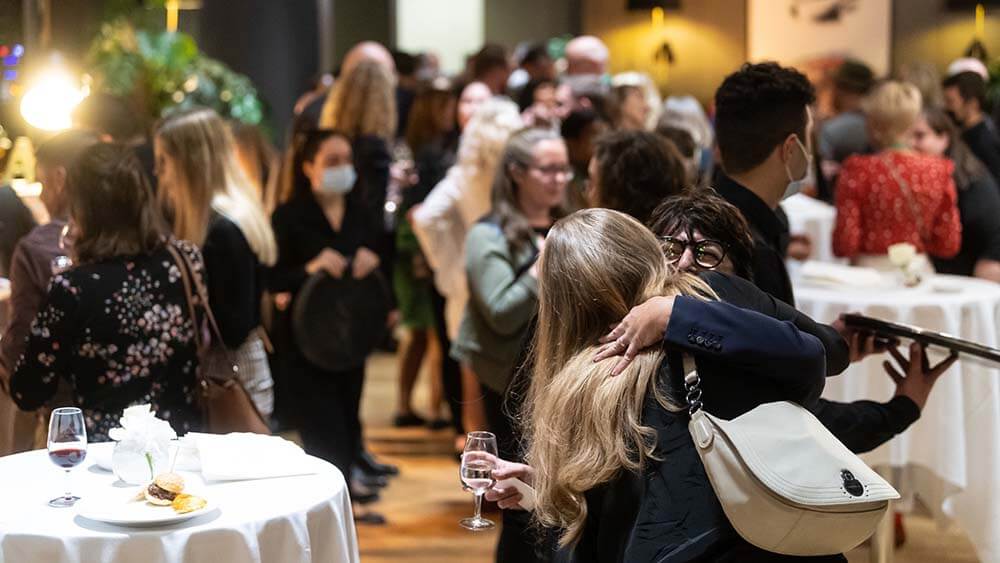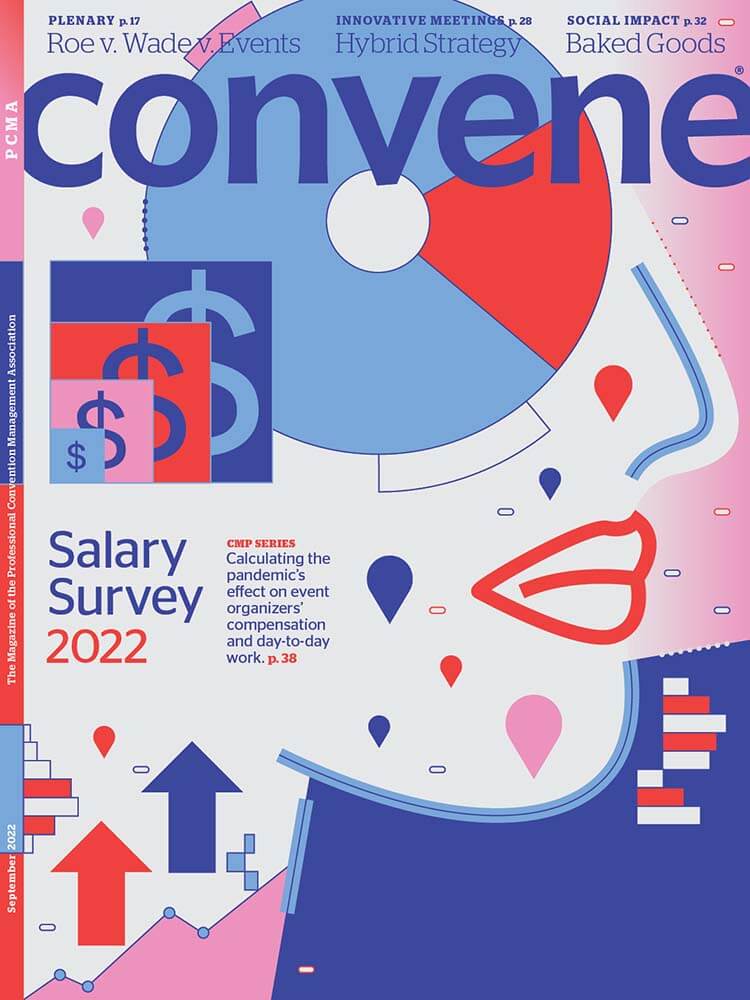
Attendees get reacquainted at Convening EMEA 2021 in Lausanne, Switzerland. Some respondents to the 2022 Salary Survey said travel, and meeting new people, were what they loved best about their event organizer roles. (Mattias Nutt/mattiasnutt.ch)
For Convene’s 2022 Salary Survey, we asked the event organizer respondents a series of open-ended questions about changes to their roles since the pandemic, what the like and dislike about their jobs, and what they would change about their jobs now. Here’s a summation of those answers, and some direct quotes for the results.
What Do You Like Best About Your Job?
The aspect of creativity was a common response, both in terms of designing events and in solving problems.
A sense of achievement also ranked high, including successfully meeting client needs, mastering the strategic parts of the job, and the satisfaction of seeing events have an impact on people and destinations. Creativity and achievement often went hand in hand and many people expressed satisfaction at being able to create an event from start to finish and bring a vision to life.
Variety was clearly an aspect of the role that people appreciated, and expressed in terms of diversity of clients, in challenges, in learning opportunities, and in kinds of events. Flexibility was another notably popular response, often paired with the ability to work remotely. Interestingly, many people also paired flexibility and a love for travel — expressing an appreciation for the ability to exercise control over their time, along with opportunities to go to new places and meet new people.
Making connections with others was another often-cited benefit of the job, with respondents expressing satisfaction with working with team members, with client relationships, and working on site with communities.
Here are some direct quotes:
- Spotting new trends and opportunities, then designing initiatives to go after them.
- Flexibility, hardworking dedicated staff, respect from leadership, working with doctor volunteers, variety of projects, travel.
- The variety and the ability to problem-solve — it’s a new challenge every day.
- New company with fresh ideas and new challenges.
- Love meeting new people, learning about other perspectives, and growing my understanding of the world. Also LOVE to travel, love the opportunity to make a difference in my chosen city.
- Watching the show come together, especially on site.
- That no two days are the same and we constantly face new and interesting challenges.
- I love planning events for my association members and working at a company that cares about its employees.
- It allows me a lot of creativity, especially since I can plan the entire program start to finish, including marketing and graphics.
- It has always been a passion, never a job.
- I love working with clients and making a vision come to life.
What Do You Like Least About Your Job?
There was a steady hum of things that have shown up before in our surveys: difficulties with budgeting, with contracts, problematic colleagues, complaints of poor leaders and bosses who micromanage. All of this, however, was dwarfed by the dissatisfaction that has come from the lack of staffing and a lack of support, within respondents’ own companies and departments, and the problems caused by lack of staffing in partner companies. Many people cited a big increase in the number of administrative tasks that they have had to take on themselves because of the lack of staffing.
Staffing challenges also resulted in problems with work-life imbalance, overwork, and stress. People also talked about the problems of uncertainty that come with trying to get meeting dates, problems with cancellations, and deteriorating relationships with venues.
Quotes:
- Covering for jobs not filling in our company (and our partners’ companies — hotels mostly) and mother-henning new people.
- Dealing with difficult personalities, impossible factors to predict, lots of unknown variables.
- Budget and resource constraints.
- Contract negotiation — dealing with hotels has become increasingly difficult in the past two years.
- Having to reset clients’ unrealistic expectations.
- Constant changes to industry, the unknown, feeling siloed and lonely, unsure about consequence of decisions I am making.
- Continued uncertainty and lack of partnership with hotels.
- Lack of staff.
- Asking staff to do more with less, for less.
- My association does not give the top meetings employee a seat at the executive table.
- Small company, so I’ve taken on lots of things that distract me from my core responsibilities.
- Stress — significant hours, inability to complete job tasks unless extra hours are worked year-round.
- No downtime. Unrelenting/unnecessary stress imposed by anxiety-ridden colleagues.
- The economic, environmental, supply-chain, and workforce challenges facing our industry.
- The perception that meeting planning isn’t a strategic body of work.
- Working with those who cannot adapt to change.
- I’m tired of taking on the work of 3 FT employees due to layoffs and high turnover rates. Working with venues has become extremely difficult — lack of response, decreased staffing levels, higher pricing, and lack of flexibility. The sense of “partnership” seems to be nonexistent between groups and venues.
RELATED: From April 2021 — What Do You Like Best, And Least, About Your Job?
What Would You Change About Your Job To Better Suit Your Life?
Many of the answers to this question addressed the “least-liked” aspects people reported about their jobs, and desired changes included adding more staff, reducing hours, having clearer boundaries, redistributing work, higher pay, and flexibility to work remotely all or some of the time.
Quotes:
- More pay. I do not enjoy my work enough anymore to call it a “labor of love.” Arguments around the pandemic eroded unity and positive relationships away.
- More people to balance the load.
- Administrative support so I can disconnect when taking time off.
- Clearer boundaries — working for a company with a global employee base makes it feel like I am always on.
- Flexibility to be remote more often.
- Hybrid working and more autonomy, less micromanaging.
- I miss the days when we were partners with venues. For the most part, it’s become very one-sided, take-it-or-leave it attitude.
- More flexibility in work schedule and working from home.
- Proper staffing and understanding of being burned out.
- Our association is currently really flexible regarding remote work and I am hoping it stays that way in the future.
- Better technical and administrative support.
- More work-life balance. Less stress. Workload spread across more staff.
How Has Your Role Changed During The Pandemic?
Among the big trends here: Many respondents felt a sense of achievement at having successfully navigated the pandemic, and it translated into tangible advantages — they learned new skills and were given new opportunities and responsibilities. They felt respected and appreciated, and in many instances, took on new and more satisfying roles.
Many companies have begun or expanded remote and hybrid working arrangements, and that was seen as a huge benefit by many respondents. Overall, the comments were much more positive than negative — many people changed jobs for the better, and as a result, were happier with working conditions and colleagues.
Quotes:
- Crisis situation allowed me to prove leadership in a short time.
- Been able to show I can step up to the plate when asked and be a true team player.
- Being able to work from home and spend time with children.
- Fully remote work schedule — never going back to the office.
- Exposure to all different types of virtual/ hybrid events and new ability to be quick and flexible with any changes.
- Gained experience with cancellations — even though I never wanted to do that.
- I have grown within the organization and feel valued. I was promoted three months ago to associate director from manager.
- Learned to be more flexible and agile, and believe I am more empathetic.
- I now work with a team of people who are all about getting the job done and supporting each other. I love it!
- It forced us to really tailor our event and it allowed us to be okay with smaller events and more targeted audience.
- Better — I’ve acquired confidence in doing my job well, since I had to do it under strenuous circumstances, and I did it well.
- Learning coding to assist with digital content for events.
- It has not changed for the better.
- I have earned the respect of my leadership — they have a better understanding of my work and the level of responsibility I carry.
- I have found my voice. I feel there is nothing to lose since I’m the last events professional left.
- I have increased responsibility and gotten a “seat at the table.”
- It has grown and the workload doubled.
- We are working closer together as a team.
- We are now trusted to work remotely. I often had many late nights at the office and the commute home was brutal — only to get up early to do it all again the next day. Now it’s much better.
- We are all starting over, and I hope we’ll be much kinder to all.
- No longer work for a bully boss.
Barbara Palmer is deputy editor at Convene.

Salary Survey 2022
The 2022 Salary Survey, conducted in late July with nearly 350 planners participating, is Convene’s September issue cover and CMP Series story. Find links to all the articles from the story package below.
